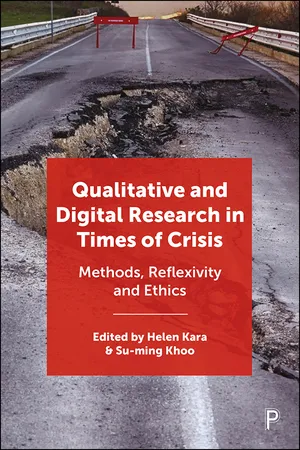
Qualitative and Digital Research in Times of Crisis
Methods, Reflexivity, and Ethics
- 272 pages
- English
- ePUB (mobile friendly)
- Available on iOS & Android
Qualitative and Digital Research in Times of Crisis
Methods, Reflexivity, and Ethics
About this book
Crises such as the COVID-19 pandemic, disasters, or violent conflict present numerous challenges for researchers. Faced with disruption, obstacles, and even danger to their own lives, researchers in times of crisis must adapt or redesign existing research methods in order to continue their work effectively.
Including contributions on qualitative and digital research from Europe, Asia, Africa, Australasia, and the Americas, this volume explores the creative and thoughtful ways in which researchers have adapted methods and rethought relationships in response to challenges arising from crises. Their collective reflections, strategies, and practices highlight the importance of responsive, ethical, and creative research design and the need to develop methods for fostering mutual, reflexive, and healthy relationships in times of crisis.
Frequently asked questions
- Essential is ideal for learners and professionals who enjoy exploring a wide range of subjects. Access the Essential Library with 800,000+ trusted titles and best-sellers across business, personal growth, and the humanities. Includes unlimited reading time and Standard Read Aloud voice.
- Complete: Perfect for advanced learners and researchers needing full, unrestricted access. Unlock 1.4M+ books across hundreds of subjects, including academic and specialized titles. The Complete Plan also includes advanced features like Premium Read Aloud and Research Assistant.
Please note we cannot support devices running on iOS 13 and Android 7 or earlier. Learn more about using the app.
Information
Table of contents
- Cover
- Title Page
- Copyright Page
- Table of Contents
- List of Figures and Tables
- Notes on Contributors
- Introduction
- Part I Reflexivity and ethics
- Part II Arts-based approaches
- Part III Digital methods
- Part IV Recurring and longer-term crises
- Conclusion
- Index